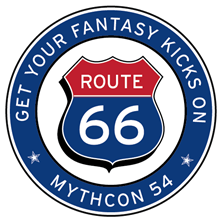Loading...
Document Type
Paper
Event Website
http://www.mythsoc.org/mythcon/mythcon-51.htm
Start Date
1-8-2021 11:00 AM
End Date
1-8-2021 11:45 AM
Description
In his introduction to Visions of Mars: Essays on the Red Planet in Fiction and Science, Howard V. Hendrix suggests that the long-standing fascination with the red planet emerges from an unspoken anxiety around the extinction of the species. According to Hendrix, the “fascination with the Neanderthals, like our fascination with greenhouse-blasted Venus or with Martians of the Dying Planet scenario, arises from forebodings that such scenarios present ourselves and our world as viewed—both seen and dreamed—through a funhouse mirror” (Hendrix 10).
The ongoing fascination with mars has resulted in texts that treat the red planet in strikingly different ways. In C. S. Lewis’s Out of the Silent Planet, Elwin Ransom is forcibly reminded of his reading of Wellsian science fiction after overhearing his captors, Devine and Weston, speak of sorns. Ransom is overcome by a vision of the alien: “No insect-like, vermiculate or crustacean Abominable, no twitching feelers, rasping wings, slimy coils, curling tentacles, no monstrous union of superhuman intelligence and insatiable cruelty seemed to him anything but likely on an alien world” (Lewis 49). His subsequent experience of the utopian world of Malacandra is offset by Weston’s imperial, colonialist vision, in which Weston foresees Malacandra as a stepping-stone for the future of humanity. Weston’s colonialist vision is darkly realized in Robert J. Sawyer’s Red Planet Blues, a book that follows in the tradition of texts anticipating the colonization of the red planet, such as Arthur C. Clarke’s The Sands of Mars and Kim Stanley Robinson’s Red Mars. Red Planet Bluesis a futuristic, cautionary tale of the exploitation of the red planet, in which the alien is recast in terms of the insipid, commercial concerns of New Klondike, a frontier town characterized by its prospectors, prostitutes, seedy bars, and corrupt police. Conversely, Andy Weir’s The Martian recasts Mars in terms of scientific exploration. Weir grounds the story of Mark Watney’s survival in scientific terms—extracting oxygen from hydrazine, growing potatoes, and planning his three-thousand-kilometre trip to Schiaparelli. At the same time, The Martian is a re-imagining of the Robinson Crusoe story, an eighteenth -century text rife with imperialist overtones. Each of these texts demonstrates a similar fascination with the alienness of the red planet and the question of human habitation. Weston’s vision of human progress is spiritually bankrupt, which is in turn realized in Sawyer’s New Klondike. The Martian is driven by scientific curiosity, but Weir returns again and again to the utter desolation of the Martian landscape. I want to argue that these texts continue to re-imagine and re-assess the future of humanity in relation to the red planet, and that more than ever, narratives of Mars serve as a mirror for the anxieties around human progress, from the spiritual to the scientific to the ecological.
Tech Mod: Holly Felmlee.
Creative Commons License

This work is licensed under a Creative Commons Attribution-NonCommercial-No Derivative Works 4.0 International License.
Included in
From Malacandra to Mars: Representations of the Red Planet in C. S. Lewis, Robert Sawyer, and Andy Weir
In his introduction to Visions of Mars: Essays on the Red Planet in Fiction and Science, Howard V. Hendrix suggests that the long-standing fascination with the red planet emerges from an unspoken anxiety around the extinction of the species. According to Hendrix, the “fascination with the Neanderthals, like our fascination with greenhouse-blasted Venus or with Martians of the Dying Planet scenario, arises from forebodings that such scenarios present ourselves and our world as viewed—both seen and dreamed—through a funhouse mirror” (Hendrix 10).
The ongoing fascination with mars has resulted in texts that treat the red planet in strikingly different ways. In C. S. Lewis’s Out of the Silent Planet, Elwin Ransom is forcibly reminded of his reading of Wellsian science fiction after overhearing his captors, Devine and Weston, speak of sorns. Ransom is overcome by a vision of the alien: “No insect-like, vermiculate or crustacean Abominable, no twitching feelers, rasping wings, slimy coils, curling tentacles, no monstrous union of superhuman intelligence and insatiable cruelty seemed to him anything but likely on an alien world” (Lewis 49). His subsequent experience of the utopian world of Malacandra is offset by Weston’s imperial, colonialist vision, in which Weston foresees Malacandra as a stepping-stone for the future of humanity. Weston’s colonialist vision is darkly realized in Robert J. Sawyer’s Red Planet Blues, a book that follows in the tradition of texts anticipating the colonization of the red planet, such as Arthur C. Clarke’s The Sands of Mars and Kim Stanley Robinson’s Red Mars. Red Planet Bluesis a futuristic, cautionary tale of the exploitation of the red planet, in which the alien is recast in terms of the insipid, commercial concerns of New Klondike, a frontier town characterized by its prospectors, prostitutes, seedy bars, and corrupt police. Conversely, Andy Weir’s The Martian recasts Mars in terms of scientific exploration. Weir grounds the story of Mark Watney’s survival in scientific terms—extracting oxygen from hydrazine, growing potatoes, and planning his three-thousand-kilometre trip to Schiaparelli. At the same time, The Martian is a re-imagining of the Robinson Crusoe story, an eighteenth -century text rife with imperialist overtones. Each of these texts demonstrates a similar fascination with the alienness of the red planet and the question of human habitation. Weston’s vision of human progress is spiritually bankrupt, which is in turn realized in Sawyer’s New Klondike. The Martian is driven by scientific curiosity, but Weir returns again and again to the utter desolation of the Martian landscape. I want to argue that these texts continue to re-imagine and re-assess the future of humanity in relation to the red planet, and that more than ever, narratives of Mars serve as a mirror for the anxieties around human progress, from the spiritual to the scientific to the ecological.
Tech Mod: Holly Felmlee.
https://dc.swosu.edu/mythcon/mc51/schedule/25



Comments
Recorded Session